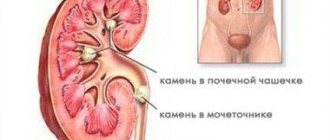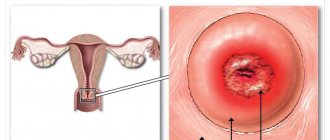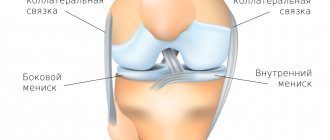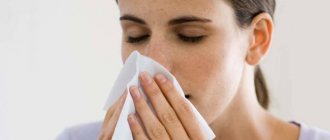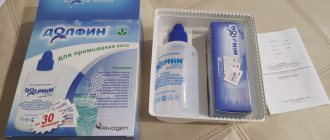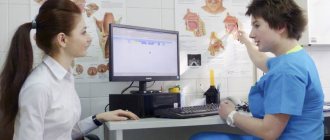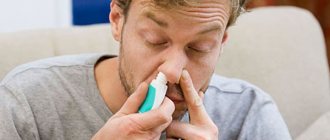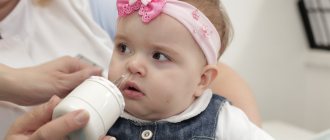Like any other pathological conditions, there can be reasons for a runny nose in infants.
- physiological;
- pathological.
Physiological reasons
The mucous membrane of the nasal cavities immediately after birth, although formed correctly, cannot fully perform its functions and participate in the regulatory mechanisms of the body. In some children, this leads to excessive dryness of the nasal cavity with insufficient secretion production, while in others it leads to excessive secretion - a newborn runny nose.
The functioning of the mucous membrane returns to normal only after reaching 10 months of age. There's no need to worry. This is not dangerous and should go away on its own over time, but the ENT doctors at Dr. Korenchenko’s clinic advise you to see a pediatrician. so as not to miss the beginning of the development of the pathological process behind the imaginary well-being.
Pathological causes
The most common cause is colds, which newborns suffer from especially often. Your own immunity has not yet been formed, and your mother’s is not always effective enough and, moreover, weakens every day. Any infection that goes completely unnoticed in an adult or older child can cause acute respiratory infections and a runny nose in a newborn.
The first symptoms of an acute infectious disease are a rise in temperature and a runny nose in the baby. Later, cough, shortness of breath, and difficulty breathing occur. Sleep and appetite disorders. The child becomes restless, cries, and refuses to eat. Excessive snot in a baby causes irritation of the skin around the nose, on the upper lip, and in the nasolabial folds. At the first appearance of such symptoms, we strongly advise you to immediately contact your pediatrician.
Another common cause of a runny nose in a newborn is an allergic reaction to an external irritant. With age and with the formation of one’s own full-fledged immune defense, this disease can go away on its own, but in infancy, intolerance to any substances is more common than in adults. Irritants can be ordinary household dust, the hair of pets or birds, foreign odors, creams and preparations that are used to treat the baby’s skin, even the smell of the mother and breast milk can provoke snot in a baby.
A relatively uncommon cause of snot in infants is vasomotor rhinitis, a disease associated with impaired blood supply to the nasal mucosa. Only a doctor can make a correct diagnosis.
Causes of a runny nose in a newborn
In the first two months of life, the baby begins to get used to a new type of breathing, because for 9 months he did not use his nose and lungs.
After birth, the nasal mucosa undergoes a process of adaptation and secretes mucus to moisten the nasal passages. In this case, the abundance of transparent discharge should not be scary. Physiological runny nose occurs without fever. You can take your child for walks in the fresh air and bathe. If the child eats and sleeps well, does not act up or cry, the parents’ task is to clear the child’s nose of mucus. Since a newborn baby cannot blow his nose, a special nasal aspirator will help clear his nose. The device is designed like a syringe and effectively sucks out mucus from the nasal passages. A common cause of a runny nose is growing teeth. The inflammatory process, affecting the gums, causes increased mucus production in the nose. After the tooth appears, the runny nose stops.
The alarm should be caused by a runny nose, due to which the child refuses to eat, sleeps poorly and cries. In this condition, the body temperature will increase.
Immediate contact with a pediatrician will prevent the development of rhinitis (inflammation of the nasal mucosa), which often develops into otitis (inflammation in the ear).
The doctor will advise you on how to care for your child’s nose every day, prescribe treatment, and prescribe the necessary medications.
In this case, parents’ initiative can only get in the way. Instilling “proven” drops, breast milk, plant or vegetable juices into a child often leads to an exacerbation of the disease.
Cause of cold
Colds are caused by many respiratory viruses. Healthy children have about 6-8 colds in the first year of life. This is because there are so many viruses that cause colds. With each new cold, the child’s body develops immunity to this virus. The influenza virus causes a more severe cold with fever and muscle aches. A cold is usually a mild illness. However, with a cold, 5-10% of babies experience complications. Most often it is an ear or sinus infection that is caused by bacteria.
Types of runny nose in newborns
A runny nose in babies has various causes. Having identified them, the pediatrician chooses treatment methods. In this case, various types of nasal agents are used.
If a runny nose is caused by physiological reasons, nasal rinsing and mucus removal using a nasal aspirator are prescribed.
If a runny nose is caused by viruses or bacteria, such an infectious runny nose should be treated comprehensively and only under the supervision of a doctor.
When a child reacts to a certain allergen (food, dust, etc.), the doctor diagnoses “allergic rhinitis.” The recommendations will require you to avoid contact with the allergen and use certain medications.
If nasal breathing is impaired, vasomotor rhinitis may occur. The main thing in its treatment is to protect the baby from inhaling strong odors (household chemicals, tobacco smoke, spices, dust). Frequent walks in the fresh air without hypothermia, ventilation and wet cleaning of the room will be an excellent prevention of this type of runny nose.
Pathogenesis
The development of a runny nose in most cases is caused by inflammation in the nasal mucosa. This process can occur independently or be a complication of infectious processes ( measles , influenza , scarlet fever , etc.). In almost 90% of cases, the mucous membrane of the paranasal sinuses is involved in the pathological process, which swells, stagnation and catarrhal inflammation develop in it.
Allergic rhinitis histamine production . The air contains many impurities that enter the nose and provoke the release of histamine. It also leads to an increase in blood flow and swelling of the walls of blood vessels. As a result, the mucous membranes produce mucus, which leads to a runny nose.
In infants, rhinitis develops quite often, as this is determined by the structural features of the nose in young children. The size of the nasal cavities and passages in children is smaller and shorter, and the walls of the shells are thicker. They have a functional immaturity of their defense systems. Since the nasal passages are very narrow, the aeration and drainage function of the paranasal sinuses is impaired. The mucous membrane of a baby is easily vulnerable and very loose, so even a minor inflammatory process leads to the development of rhinitis . In addition, there is no cavernous tissue in the child’s nasal turbinates, which causes the low effectiveness of vasoconstrictor drops. Since the paranasal sinuses in infants are not yet sufficiently developed, sinusitis , frontal sinusitis , and ethmoiditis develop very rarely in them.
Most often, rhinitis develops during a period when very sharp temperature fluctuations are observed. Under such conditions, pathogenic and opportunistic microflora in the nasal cavity, oral cavity and nasopharynx, which ultimately leads to the development of an infectious process.
Types of nasal products for newborns
Depending on the diagnosis, the doctor will prescribe certain nasal medications. These can be moisturizing or antiseptic, antiviral or vasoconstrictive, antihistamine or homeopathic. Antibiotics are used to fight bacterial infections.
Since babies under one year old cannot swallow tablets, all drugs are prescribed in the form of drops or solutions. Parents need to learn how to properly bury their baby's nose so as not to cause the child's displeasure and reluctance to continue the procedure.
What is Derinat?
It is sodium deoxyribonucleate. In other words - nucleic acid. Derinat helps improve the functioning of the immune system at different levels and reduce the activity of pathogenic microorganisms. In addition, Derinat has a reparative (restorative) effect on the mucous membrane, which is very important in the treatment of runny nose caused by viruses. It is the mucous membrane that serves as the first and main protective barrier against both respiratory viruses that cause a runny nose and a secondary bacterial infection that can cause complications. Taking Derinat helps strengthen the mucous membrane, improve its barrier properties and avoid complications. It is especially important to strengthen the mucosa when using vasoconstrictor drops, which can provoke drying and damage to the epithelium.
Isotonic solutions
Isotonic (or saline) solutions are necessary to moisturize the nasal cavity in order to remove its excessive dryness.
Isotonic solutions are prepared using sea water. They can serve as first aid for rhinitis.
If the runny nose is in full swing, the solution washes away the mucus, clears the child’s nose, localizes the swelling, and makes breathing easier.
You can put the solution in your child’s nose, 3-4 drops every 2 hours.
Such solutions are used as prophylaxis for caring for mucous membranes, softening crusts and for preparing the nasal passages before instilling medicinal drugs, since, for example, antiviral drops will not work on dry mucous membranes.
Consequences and complications
If a runny nose in a baby does not go away for a long time or is repeated very often, later it can provoke the development of sinusitis , otitis , sinusitis , adenoiditis , bronchitis . Insufficient oxygen supply for a long time can lead to delayed development of the baby.
Prolonged runny nose leads to general poor health and anxiety in the child, and can also interfere with normal nutrition.
Immunomodulators
A runny nose in an infant often develops against a background of reduced immunity. Having determined this, the doctor will prescribe immunomodulatory drops. By changing the number of immune cells towards an increase, they increase immunity, have a positive effect on the healing process and guarantee the absence of complications. These drops are of plant and artificial origin.
For infants, such drugs must be diluted before use.
The group of immunomodulators includes immunostimulants. They activate the body's immune defense. Such drugs with antiviral or antibacterial effects will restore the mucous membrane and help quickly cure its damage.
Classification
The following types of rhinitis are defined:
- Infectious – develops as a consequence of the development of an infectious process.
- Allergic - as an allergic reaction to external irritants.
- Non-allergic, non-infectious persistent - nasal disorders, which include different types of specific rhinitis (medicinal, occupational, hormonal, idiopathic vasomotor).
In some cases, when talking about runny nose in infants, experts identify the so-called physiological runny nose in infants. Physiological rhinitis develops immediately after childbirth and is a consequence of the adaptation of the mucosal microflora to the environment.
Antibacterial
When yellow or green mucus accumulates in the nasal passages and pus appears, we are talking about a bacterial infection.
Antibacterial agents containing antibiotics are prescribed after confirmed diagnosis.
Preparations with silver ions actively resist bacterial inflammatory processes. They effectively fight the proliferation of pathogenic bacteria, but the drops must be used with caution; before use, you need to read the instructions for the drug.
Main types of runny nose
1.
Infectious
- the most common variant, which is combined with mucous discharge (and subsequently yellow or greenish-yellow), often with fever and cough.
2.Allergic
- copious clear, watery discharge, which may be accompanied by sneezing and redness of the eyes.
What drugs are prohibited
Strictly prohibited:
- Vasoconstrictors that are not suitable for age. Medicines for newborns must have a note indicating the permissible age of use.
- Untested drugs on the advice of friends or pharmacy workers, not agreed with the attending physician.
- Oil based drops. This can cause inflammation due to gluing of the cilia of the internal epithelium.
- Instillation with plain water.
- Preparations with streptomycin.
- Folk remedies for nasal instillation are herbal decoctions, vegetable juices (aloe, propolis, carrot and beet juice). They manifest themselves as a painful reaction of the mucous membrane or cause allergies.
- Sprays and rinses of the nasal passages under pressure.
Additional benefits of Derinat?
- Thanks to the properties of Derinat, it can be used not only as a treatment for a viral runny nose, but also to prevent further episodes of acute respiratory infections.
- Derinat does not have a pronounced odor and does not irritate the mucous membranes. And this has a beneficial effect on the reaction of children, and therefore on the result of treatment.
Read the instructions for how to properly use Derinat in the treatment of ARVI.
Precautionary measures
- When instilling the drug for the first time, you need to carefully monitor the baby’s condition, since even a harmless drug can cause individual intolerance.
- If unusual symptoms appear (cough, redness of the skin, rash), you should immediately consult a doctor.
- When cleaning the nose of a child under one year old, using drops during treatment must be done very carefully so as not to damage the sensitive mucous membrane and narrow nasal passages.
- Saline solutions for infants are instilled 2-3 drops into each passage, rather than rinsed. A large flow of water can cause spasms.
- The nose is cleaned with cotton “turundas” - thin “flagella” twisted from cotton wool. The use of cotton swabs is prohibited, as there is a high risk of injury.
- Use nasal medications only in doses prescribed by your doctor. Overdose is dangerous.
How can I help my baby?
The intensity and duration of a physiological runny nose depends on the conditions in which the child lives, as well as on good hygiene of the nasal cavity.
Normalization of the room microclimate
It has been scientifically established that the condition of the mucous membranes of the respiratory tract is largely determined by the kind of air the child breathes. Dry, overly warm air, saturated with dust particles, provokes hypersecretion. In this regard, it is necessary:
- Ensure indoor air humidity is at 60-70%. For this purpose, you can purchase a humidifier with a device that allows you to set the necessary parameters. If this is not possible, then hang wet towels near the reflector and the crib.
- Ventilate the room regularly. It is advisable that the temperature in the nursery should not exceed 22 ° C. Too warm air dries out mucous membranes and promotes the growth of bacteria.
- Regularly wet clean the room, remove “dust collectors” (wool blankets, soft toys, books, etc.), and do not allow pets near the baby. However, you should not wipe surfaces with a disinfectant solution every day: excessive sterility has a negative impact on the development of the baby’s immune system.
In addition, you need to walk with your child in the park 1-2 times a day; remember that the baby must receive the required amount of liquid - milk and water; If possible, do not give up breastfeeding: immunoglobulins contained in mother’s milk increase the child’s body’s resistance to infections. It is useful to carry out hardening procedures, for example, air baths, wiping handles with water.
Features of therapy for children under one year old
Treatment of young children should be approached with extreme caution. At this age, many drugs are contraindicated and most procedures cannot be performed.
Treatment should be carried out by a specialist who, based on the research carried out, can prescribe the following groups of medications approved for use in babies under one year of age:
- Vasoconstrictors. Milder nasal drops containing a small amount of active substance are prescribed. The therapeutic effect is based on relieving congestion and eliminating a runny nose. The drugs can cause addiction, so the duration of the course should not exceed 3-5 days. Frequency of use up to 3 times a day. Nazol Baby, Nazivin Sensitive may be prescribed.
- Based on sea salt. Such nasal drops are completely safe because they are based exclusively on natural ingredients. They have a gentle effect on the mucous membranes, improving breathing and overall well-being. They help fight a runny nose, but do not affect the cause of the symptom. Used as a complex therapy and daily cleansing of mucus from the nasal passages for the prevention of diseases. Effective representatives: Aqualor Baby, Otrivin Baby.
- Antihistamines. They are used if the cause of a runny nose and congestion is an allergen. Then, to relieve symptoms in infants, Histimet, Vibrocil, Zyrtec are prescribed. Such drugs can relieve swelling, inflammation and normalize respiratory function.
When using medications for children, it is necessary to monitor the dose and duration of the course. They must not be exceeded. If the causes of nasal congestion in a child are viral, colds and other conditions, other medications may be prescribed. They try to prescribe drops with the most natural composition, fewer contraindications and side effects.
The baby is one month old: what can’t be used to treat a runny nose?
- You should not use traditional medicine (the juice of any plants, honey) in the treatment of infants. You may get a completely unexpected reaction in the form of individual intolerance.
- Avoid using products that have age restrictions. Please note that not all sprays and drops are suitable for use in infants.
- You shouldn’t “warm your nose.” This way you can speed up the spread of infection and aggravate the baby’s condition.
Products Derinat
- Drops
- Spray
- Bottle
- Injections
Useful articles:
How to treat children Treatment of children with folk remedies About diseases: Influenza ARI/ARVI Cough Runny nose
Disease prevention What to feed What to drink About drugs How to entertain Tips Adult health


